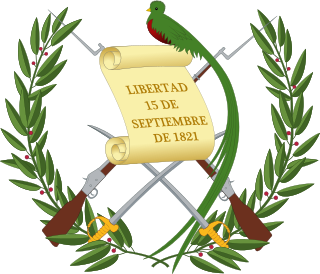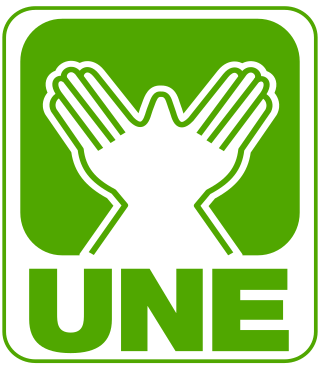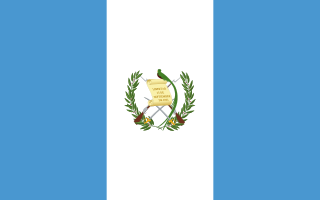
Central America is a subregion of the Americas. Its political boundaries are defined as bordering Mexico to the north, Colombia to the south, the Caribbean Sea to the east, and the Pacific Ocean to the west. Central America usually consists of seven countries: Belize, Costa Rica, El Salvador, Guatemala, Honduras, Nicaragua, and Panama. Within Central America is the Mesoamerican biodiversity hotspot, which extends from northern Guatemala to central Panama. Due to the presence of several active geologic faults and the Central America Volcanic Arc, there is a high amount of seismic activity in the region, such as volcanic eruptions and earthquakes which has resulted in death, injury, and property damage.

Politics of Guatemala takes place in a framework of a presidential representative democratic republic, where by the President of Guatemala is both head of state, head of government, and of a multi-party system. Executive power is exercised by the government. Legislative power is vested in both the government and the Congress of the Republic. The judiciary is independent of the executive and the legislature. Guatemala is a Constitutional Republic.

The National Unity of Hope is a populist political party in Guatemala. It was founded in 2002 and defines itself as a social-democratic and social-Christian party. It is the largest political party in Guatemala by the number of members.

General José Miguel Ramón Ydígoras Fuentes was the conservative President of Guatemala from 1958 to March 1963. He was also the main challenger to Jacobo Árbenz during the 1950 presidential election. He had previously served as the governor of the province of San Marcos.

Guatemalans are people connected to the country of Guatemala. This connection may be residential, legal, historical or cultural. For most Guatemalans, several of these connections exist.

Álvaro Colom Caballeros was a Guatemalan engineer, businessman and politician who served as the President of Guatemala from 2008 to 2012, as well as leader of the political party, National Unity of Hope (UNE).
Iztapa, or Puerto de Iztapa, is a municipality in the Escuintla department of Guatemala. It is located on the shores of the Pacific Ocean and surrounded by Michatoya and Maria Linda Rivers, and also by the Canal de Chiquimulilla. Its population is about 15,000 people.

General elections were held in Guatemala on 9 September to elect a new President and Vice President of the Republic, 158 congressional deputies, and 332 mayors. As no presidential candidate received a majority of the vote, a second round was held on 4 November.
The Central American crisis began in the late 1970s, when major civil wars and communist revolutions erupted in various countries in Central America, causing it to become the world's most volatile region in terms of socioeconomic change. In particular, the United States feared that victories by communist forces would cause South America to become isolated from the United States if the governments of the Central American countries were overthrown and pro-Soviet communist governments were installed in their place. During these civil wars, the United States pursued its interests by supporting right-wing governments against left-wing guerrillas.

Most traditional foods in Guatemalan cuisine are based on Maya cuisine, with Spanish influence, and prominently feature corn, chilies and beans as key ingredients. Guatemala is famously home to the Hass avocado.

The Anglican Church in Central America is a province of the Anglican Communion, covering five sees in Central America.
Operation PBHistory was a covert operation carried out in Guatemala by the United States Central Intelligence Agency (CIA). It followed Operation PBSuccess, which led to the overthrow of Guatemalan President Jacobo Árbenz in June 1954 and ended the Guatemalan Revolution. PBHistory attempted to use documents left behind by Árbenz's government and by organizations related to the communist Guatemalan Party of Labor to demonstrate that the Guatemalan government had been under the influence of the Soviet Union, and to use those documents to obtain further intelligence that would be useful to US intelligence agencies. It was an effort to justify the overthrow of the elected Guatemalan government in response to the negative international reactions to PBSuccess. The CIA also hoped to improve its intelligence resources about communist parties in Latin America, a subject on which it had little information.

The following outline is provided as an overview of and topical guide to Guatemala:

Guatemala, officially the Republic of Guatemala, is a country in Central America. It is bordered to the north and west by Mexico, to the northeast by Belize, to the east by Honduras, to the southeast by El Salvador. It is touched to the south by the Pacific Ocean and to the northeast by the Gulf of Honduras. With an estimated population of around 17.6 million, Guatemala is the most populous country in Central America and the 11th most populous country in the Americas. It is a representative democracy with its capital and largest city being Nueva Guatemala de la Asunción, also known as Guatemala City, the most populous city in Central America.

Guatemalan Spanish is the national variant of Spanish spoken in the Central American country of Guatemala. While 93% of Guatemalans in total speak Spanish, it is the native language of only 69% of the population due to the prevalence of languages in the indigenous Mayan and Arawakan families. Guatemalans typically use the second-person singular personal pronoun vos alongside the standard Spanish second-person singular pronouns tú and usted to form a three-level system of second-person singular address.

Norma Cruz is a Guatemalan human rights activist known for her work documenting violence against women.

Violence against women in Guatemala reached severe levels during the long-running Guatemalan Civil War (1960-1996), and the continuing impact of that conflict has contributed to the present high levels of violence against women in that nation. During the armed conflict, rape was used as a weapon of war.

The COVID-19 pandemic in Guatemala was a part of the worldwide pandemic of coronavirus disease 2019 caused by severe acute respiratory syndrome coronavirus 2. The virus was confirmed to have reached Guatemala in March 2020.

Cuba-Guatemala relations refers to the bilateral relations between Republic of Cuba and Guatemala. Both nations are members of the Association of Caribbean States, Community of Latin American and Caribbean States, Organization of Ibero-American States and the United Nations. Cuba has an embassy in Guatemala City and Guatemala has an embassy in Havana.












